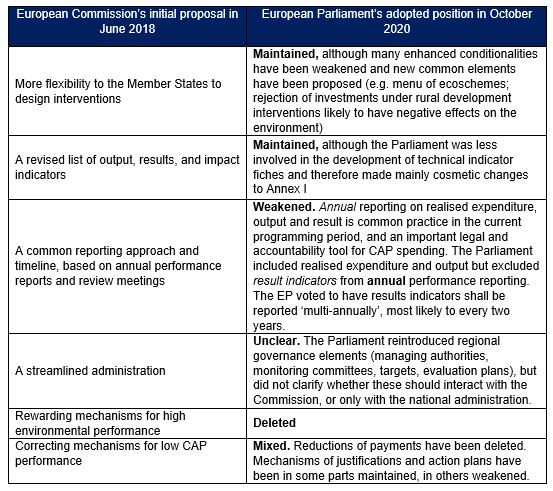This article assesses whether the European Parliament’s adopted position in October 2020 has strengthened, maintained, or weakened the Commission’s initial proposal to shift the CAP focus from compliance to performance. The results show that despite lofty rhetoric, the Parliament has undermined many elements of the performance approach of the CAP reform. In this context, will the Commission consider withdrawing its CAP proposal, or strongly holding its positions on the CAP reform via amendments, during the trilogue negotiations?
Introduction
A new way of working, focused on performance and higher flexibility for the Member States, was a core element of CAP reform post 2020. As outlined on the Commission’s website, this reform aimed to shift the emphasis from rules and compliance towards results and performance. This in turn would have simplified and modernised how the CAP works.
The Commission’s proposal was largely welcomed by EU legislators and national agri-ministries looking for more freedom to design interventions back home, meaning also less attention from the technocratic Brussels on compliance and checks.
On the other hand, a ‘performance-approach’ is a jargon (or belief) widely accepted in our contemporary ‘performance society’, whose activities are increasingly digitalised, associated to quantitative values and matrices, controlled by dashboards, embedded with digital devices, mixed with gamification principles (e.g. performance bonus, penalties, gadgets), etc.

In a heavily scrutinised CAP, ‘performance’ was also a fancy concept for agri-ministers and EU co-legislators to convey a new look of ‘modernity’ to an old-fashion CAP. For example, it is no doubt an attention-seeking move for MEPs – some who have been for three mandates in the AGRI-Committee of the European Parliament – to propose a leading-edge English term like ‘performance review’. However, this can also be seen as window dressing to sell some novelties in the policy reform to their allied national media, farmers unions and food industry.
In the Commission’s initial proposal, a simplified and performance-oriented CAP reform consisted of:
- More flexibility to the Member States to design interventions and reach EU wide common objectives and results.
- A revised list of output, results, and impact indicators, introducing new elements to capture the CAP ‘correlation’ with aspects like pesticides use in agriculture, smart villages, antimicrobic resistance in agriculture, etc.
- A common reporting approach and timeline, based on annual performance reports and review meetings about the implementation of the CAP – based on financial data, output and result indicators, the latter to be used for target and milestones setting.
- A streamlined administration, with the Commission dealing only with 27 CAP Strategic Plans merging Pillar I and II interventions, rather than 118 Rural Development Programmes, in many cases, managed at lower subsidiarity levels (regional authorities).
- Rewarding mechanisms for high environmental performances based on the attribution of a performance bonus.
- Correcting mechanisms for low CAP performance, based on the submission of a justifications/action plan by the Member States to the Commission, and the reduction of payments in case of high deviations from annual planned output and expenditure ratio.
These are the main elements which compose the Performance Monitoring and Evaluation Framework (PMEF) for the CAP post 2020. There are many other important aspects and details related to these and other elements of the PMEF, for instance ex ante, interim and ex post evaluations; evaluation plans; rules on publication, functionally independency, and transparency of evaluations; certifying bodies, etc. There are also aspects about the PMEF itself, which would deserve a separate analysis: data quality and situations in the Member States; indicators reliability and sensitivity; civil society and scientists’ engagement; transparency and independency; additional indicators at national and regional level; evaluation capacity at national, regional, and local levels; political misuse or lack of use of evaluations to steer the CAP.
This article is limited only to an analysis of the position adopted by the European Parliament in October 2020 compared to the Commission’s initial proposal for the PMEF, and check whether this has strengthened, maintained, or weakened the Commission position. Table 1 presents a short summary of the findings, followed by a more detailed discussion of the most critical amendments.
Having been elected by European citizens, the Parliament’s position should ostensibly represent the EU citizens’ rights and demands for accountability, transparency, value-for-money and more sustainable agricultural and rural policy. Its analysis is important as it will be negotiated in the coming months with the position agreed by the agri-ministries in the Council. A final agreement between the co-legislators on the CAP post 2020 is expected around summer 2021.

Removing annual reporting on result indicators
Amendment 54 to Recital 58 removes the legal background for the Member States to report the achievement of targets on an ‘annual basis’. This is a step backwards compared to the current RDP where the reporting was annual. In the direction of watering down the Member States’ commitments to annual performance reporting, the major three political groups – Renew Europe, EEP and S&D group – voted for following amendments:
- Amendment 662 to Article 115 (removing “annual” performance reporting)
- Amendment 673, 674, 675, 676, 679, and 680 to Article 121 (removing “annual” performance reviews and reports)
- Amendment 685 to Article 122 (removing “annual” review meetings)
The Parliament not only removed the annual frequency of performance reports, but also limited the time of action for the Commission, by restricting to “the maximum of one month” for the Commission to review and provide observations to the performance reports (Amendment 681).
The Council has adopted a similar position to have bi-annual reporting of target achievements. This was grounded on the Member States’ quests for simplification and fear to be penalized by the Commission in case of deviations, a situation which is difficult to imagine considering the political dimension beyond the technocratic nature of this exercise. In any case, these positions undermine the few tools available for the Commission to steer the policy towards the agreed, EU-wide objectives.
Weakening performance mechanisms
Related to the removal of annual reporting on result indicators, and their postponement to multiannual reporting, the Parliament:
- Maintained the provision of justifications to the Commission when the Member States deviates from the planned targets (Amendment 682 to Article 121). However, it now requires the Member States to submit of an action plan only “when necessary”.
- Removed the performance bonus to reward good performance in relation to climate and environmental targets (Amendment 688 to Article 122 and Amendment 689 to Article 124).
Scapegoating the EU for a weak PMEF’s data systems
Amendment 800 to recital 58 acknowledges the lack of, and weaknesses in, indicators for monitoring CAP results in relation environment-specific objectives (biodiversity, water, soil). The Commission has already identified these weaknesses a long time ago. On many occasions, the Commission asked the Member States to tackle these issues, with little success.
Data and accountability problems are often rooted in the Member States, rather than in EU statistics. Instead of dealing with the real causes of the problems – the lack of public commitments and the quest for so-called ‘simplification and deregulation’ pushed by agri-ministries – the Parliament can be seen to be engaging in gaslighting. This amendment shifts the problem from the Member State or regional level – where usually it originates – to the EU institutions, by demanding the Commission somehow solve the issue with the EU budget. All the while the Member State is let off the hook for poor data collection.
Moreover, Amendments such as 116 to Article 7, might sound positive because they clarify that a “common indicator shall be based on official sources”. However, these amendments naïvely overlook the fact that already existing official sources are often lacking, outdated, and need the Member States’ investments in data collection to overcome their weaknesses. Furthermore, if data gaps exist in the Eurostat or FADN, the Parliament’s adopted amendment 699 removes the Member States from any responsibility to solve them and leaves them instead on the Commission’s shoulders.
Having not encouraged the national and regional governments to seriously collaborate with the Commission, MEPs who voted in favour of the Parliament’s adopted text cannot go on national media in good faith claiming to have strengthened the existing accountability system. It is evident instead that three major political groups in the Parliament are not actually interested in creating a stronger accountability system by, for instance, addition provisions on the adoption of data quality standards.
What would such a genuine attempt to get accountability for the money spent in CAP look like? It would mean interoperability of databases, smart application forms for beneficiaries, open and secure access to anonymized databases to allow independent evaluations, and more in this vein.

A Regional PMEF: what is the Commission’s role?
In the position adopted by the European Parliament, numerous amendments introduced a regional dimension to the CAP Strategic Plans, for instance: regional managing authorities, regional monitoring committee, regional intervention programmes, regional evaluations, regional evaluation plans, etc. Amendment 119 to Article 7 introduced the breakdown of output and result indicators at regional level as it is the case in the current programming period 2014-2020.
A major change in how CAP functions, part of what was promoted as a new delivery model, is the transfer of significant responsibility over to national authorities. If the European Parliament’s amendments – which introduce again regional governance aspects (programmes, authorities, SWOTs, indicators) – are agreed with the Council in the trilogues negotiations, it remains unclear whether the Commission will stick to its initial proposal to deal only with 27 CAP Strategic Plans, or will go back to the current situation where the Commission deals with 118 RDPs.
Stability vs improvement of common indicators
Amendment 120 to Article 7 sets a timeline for the Commission to carry out a full assessment of the CAP indicators: output, result, and impact. Only by the end of the third year of application of the CAP Strategic Plans, can the Commission revise the list of indicators in Annex I. This amendment might ensure stability in the indicator collection and analysis (benchmarking, measuring progresses, etc.), assuming that these indicators are correct, meaningful, and precise. Otherwise, EU citizens will need to wait at least until 2026 (i.e. three years after the likely entrance into force of the CAP Strategic Plans in January 2023) to have an improved accountability system.
Commission’s powers on PMEF: from implementing to delegated acts
Amendment 671 to Article 120 changes Commission’s powers in relation to the PMEF, passing from the ability to adopt implementing to delegating acts. There are various differences between these two instruments in terms of the role of expert committees, Parliament, and Council, which are well explained in this link.
In simple terms, reducing the Commission’s powers from implementing to delegating acts ensures that the Parliament and Council can still have two months to formulate objections to any acts adopted by the Commission to supplement the provisions regulating the PMEF (e.g. list of indicators, methods of calculation, guarantees for accuracy and reliability, etc.).
Postponing assessments of CAP Strategic Plans’ integration with the European Green Deal
In terms of integration with, and efforts to reach the European Green Deal targets, the Parliament established that the Commission should conduct this assessment only ‘after’ the approval of the CAP Strategic Plans, rather than before (Amendments 987 and 1335 to Article 127). The Parliament could have included this assessment as part of the Member States’ ‘ex ante evaluation’ of the CAP Strategic Plans, and/or as criteria for the Commission to approve the national CAP Strategic Plans. Besides rhetoric, it is questionable as to whether the three major political groups ever believed in the urgent importance of the Farm to Fork and Biodiversity Strategies. As the MEP Paolo De Castro (S&D) put in a webinar held on Friday 6th November and attended by more than 600 participants including agronomists, students, researchers, e.g.: “We cannot believe in this ideology. The Farm to Fork and Biodiversity strategies are just a communication, not a legislation”.
Improving impact indicators relevant for the European Green Deal
Positive news comes via amendment 1340 to Article 129, in which the European Parliament demands the Member States improve the quality and frequency of data collection for key targets foreseen under the European Green Deal, corresponding to:
- I.10 GHG emission from agriculture
- I.15 GNB on agricultural land
- I.18 Farmland Bird Index
- I.19 Protected Species and Habitats
- I.20 Landscape features
- I.26 Antibiotic use
- I.27 Pesticides
- I.32 Agricultural area under organic farming (if the amendment refers to the new PMEF fiches).
The need for this amendment reflects the many issues and concerns about the data quality available to carry out sensitive assessments of these, and many other impact indicators.

Evaluations in the Member States
Article 126 of the Commission’s initial proposal established that all evaluations in the Member States should be made public. However, no amendments have been added by the Parliament to clarify a common timeline across the Member States, and how this timeline at national level should be harmonized also with the Commission’s multiannual evaluation plan (Article 127).
No amendments have been added to make more explicit the ‘practical’ differences or relationships between the evaluations under Article 126 and the (most likely bi-annual rather than annual) performance reports (Article 121). In terms of ‘functionally independent evaluations’, no amendments have been proposed to ensure this condition in practice by, for instance, adding provisions to publish open databases on CAP beneficiaries (anonymized, structured, longitudinal, and interoperable databases).
Evaluation Plans in the Member States
Article 126 of the Commission’s proposal established the Member States’ submission of an evaluation plan to their (national) Monitoring Committee no later than one year after the adoption of the CAP Strategic Plans. However, no amendments have been added to ensure the submission of the evaluation plans also to the Commission, which would allow their analysis and the needs of capacity building across the Member States. If the Parliament wanted to help the Commission to identify data gaps or areas of improvements in the PMEF at national level, this could have been a first step.
Indicators
Considering the little involvement of the European Parliament in the discussions on the technical fiches, there is little to assess from the Parliament’s position on the indicators. Besides some cosmetic amendments on the titles of the indicators, the Parliament as well as many civil society organisations and scientists have hardly followed the detailed work and technical changes on the indicators fiches. Nevertheless, it is argued here that the analysis of the new PMEF indicators deserves a careful technical, as well as political screening.
Besides the common elements of the PMEF, compared to the current legislation for Rural Development, the new CAP reform does not contain any provisions which encourage or slightly regulate the Member States to develop and assess national or regional indicators ‘additional’ to, or complementary to the common one included in Annex I.
Final thoughts
More than the indicators themselves, it is the broader framework of the PMEF itself that is weak and might be further undermined in the trilogues negotiations. This does not only refer to the amendments discussed in this article, but goes beyond: e.g. the final use of indicators to steer the policy; the investments to improve the frequency, rapidity, and quality of data reporting on societal and environmental challenges; the political will among EU, national and regional institutions to view evaluation as an opportunity for policy transformation rather than a EU-led burden, symbolic, or a bureaucratic task.
There needs to be a stronger and more concrete commitment to improve the transparency, integration, and precision of the accountability systems at multiple governance levels (European, national and regional levels), which finally engage and guide citizens in evidence based decision making processes, and sensibly demonstrate value for money spent to provide public goods and services.
Download this article as a PDF
 This article is produced in cooperation with the
This article is produced in cooperation with the
Heinrich Böll Stiftung European Union.
More on CAP Strategic Plans
A Rural Proofed CAP post 2020? – Analysis of the European Parliament’s Position
CAP Beyond the EU: The Case of Honduran Banana Supply Chains
CAP | Parliament’s Political Groups Make Moves as Committee System Breaks Down
CAP & the Global South: National Strategic Plans – a Step Backwards?
CAP Strategic Plans on Climate, Environment – Ever Decreasing Circles
European Green Deal | Revving Up For CAP Reform, Or More Hot Air?
Climate and environmentally ambitious CAP Strategic Plans: Based on what exactly?
How Transparent and Inclusive is the Design Process of the National CAP Strategic Plans?






